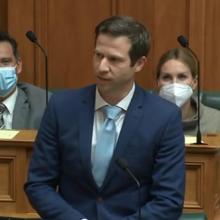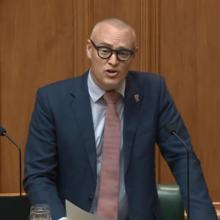
Mr Mooney had the great good fortune, soon after his arrival in Parliament, to have his lucky number drawn in the parliamentary biscuit tin raffle which determines which members’ Bills make it on to the order paper.
All opposition MPs are expected to have a Bill in their name ready and waiting to be drawn, for three reasons: it is valuable exposure and experience for backbench MPs, it is one of the few occasions when not in government that an MP can engineer a law change and, more tactically, the more opposition Bills in the ballot the less chance of a government backbencher getting a Bill drawn.
With this in mind, standing orders — Parliament’s rule book — were changed for this term to allow any member’s Bill with the support of 61 or more non-executive MPs members to be introduced without needing to go through the ballot.

But back to Mr Mooney who, like many newly arrived MPs, inherited someone else’s slightly dusty, so far unused member’s Bill for his first ballot.
Former Treaty negotiations minister Chris Finlayson drafted the Te Ture Whenua Maori Bill when he was in Parliament, and versions of it have been handed down from spokesman to spokesman since.
The Bill concerns 5% of the landmass of New Zealand, the mere 1.4million hectares — or 27,000 blocks — of Maori land owned by multiple people.
Whenua is of vital importance to Maori, not the least because so little of the land held by iwi and hapu at the time Europeans arrived in New Zealand remains in their possession.
Multiple ownership is one of many ways iwi have acted to prevent the old settler trick of getting one chief to sell them a desirable plot and then claiming an authorised full title to it despite the objections of others who had an interest in the land happening in the modern day.
It does, however, pose a problem if — as is so often the case — some owners of a block wish to develop the land but others do not.
A large percentage of the hectares in question could be productive land, if only everyone would get on the same page and agree to that happening.
Although Mr Mooney is quick to espouse the multimillions which could be earned by Maori if his Bill was passed, he is equally as rapid to reassure people that the proposed law change would protect the right to retain, control, occupy and develop land themselves as a taonga tuku iho (treasure handed down) for the benefit of present and future generations.
The Labour Party Maori caucus actually agree with Mr Mooney that there is an issue here which needs to be resolved: many hapu and iwi want to give themselves a hand up, but the current strictures governing their land mean there is no hope of getting on the ladder.
There has been some expression of this in recent days, Maori Development Minister Willie Jackson announcing a $10million fund last week to support Maori land owners to expand existing operations and looking for ways to prepare for new ventures.
However, Maori land is likely to be far too hot a political kumara for Labour to wish to grasp this term — especially as they are well aware they might be reliant on the Maori Party if they want to remain in government after the next election.

Quite what they would replace it with — or if they would actually replace it with anything at all — is a moot point though.
Mr Mooney is likely to find his first effort at lawmaking doomed to failure, but there is an argument to be made that it would be worth sending to select committee to at least get the conversation started.

Wheels spinning
National Kaipara ki Mahurangi MP Chris Penk went for a cheap laugh during Question Time on Tuesday, asking Dunedin Labour MP and Commerce Minister Dr David Clark: "Will improving competition in the supermarket sector make mountain bikes cheaper?".
Dr Clark, as is well known, took an unauthorised spin on his bike during the first Covid-19 lockdown, but Mr Penk’s prod gave Dr Clark a chance to punch back.
"They’ve only got jokes on that side of the House; we actually take the ordinary matters that consumers are facing, the hard yards that Kiwis are doing, seriously," Dr Clark replied.
"We’re determined to make change that matters."
Career upgrade
Dunedin National list MP Michael Woodhouse has suffered a few demotions in his political career, but he received a pleasing promotion during this week’s committee stages of the Pae Ora (Healthy Futures) Bill.
"I call Dr Michael Woodhouse," chairwoman Jenny Salesa said, granting Mr Woodhouse the call and a new title.
While Mr Woodhouse did once run a hospital, he recently received an award for his long service as an accountant, not as a doctor.
Kaumatua
The South has lost a vast sum of political knowledge in the past few weeks.
At the start of April, Sir Robin Gray, former National MP for Clutha and a one-term Speaker of the House, died, and last weekend Lange-era Labour Cabinet minister and Dunedin North MP Stan Rodger died.
Both men kept a keen interest in politics until their final days, and each received regular visits from their political successors, to whom they offered guidance and mentorship.










